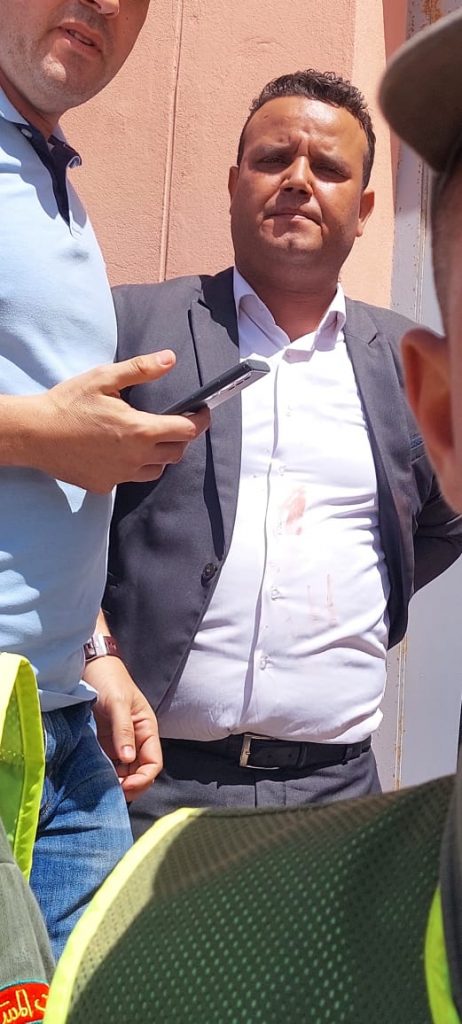Equipe Media – 21/05/2023
Dakhla – Occupied Western Sahara
Fatima Haidara, a 32-year-old Sahrawi woman, said that she was assaulted by the governor of the occupied village of Bir Gandouz in southern Dakhla as she tried to enter a housing complex that was supposedly intended for Moroccan settlers..
Haidera told Equipe Media that she and her family have been living in harsh and miserable conditions, lacking even a proper dwelling. Despite repeated requests to the occupation administration for housing, she has faced delays, evasiveness, and outright refusal.
In an effort to secure housing, Haidera and her family embarked on a year-long protest under inhumane conditions in front of the Bir Gandouz governorate building.
The protest was demanding the allocation of a home from a housing complex supposedly intended for a new group of Moroccan settlers.
Prior to the distribution of the apartments, Haidara and her family attempted to enter one of them. However, they were violently assaulted by the area’s commander, causing Haidera to lose consciousness.
“The Moroccan official refused to call an ambulance, despite my bleeding and my sisters’ pleas,” Haidara said. “The ambulance did not arrive until an hour later.” At the hospital, nurses and doctors refused to stitch her wound, resorting to primitive methods to stop the bleeding.
Haidara said that the assistant of the gendarmerie unit in the occupation refused to provide her with an incident report, claiming he did not possess a copy. This highlights collusion between the governor and the gendarmerie assistant.
Haidera’s story reflects the true suffering endured by the Sahrawi people under Moroccan occupation. It also sheds light on the challenging and tragic circumstances they face, struggling to obtain basic rights such as housing and security.
Equipe Media contacted Sahrawi activist Rachid Essgahir, residing in the occupied city of Dakhla, who confirmed the deliberate policies pursued by the Moroccan occupation that deprive Sahrawis of their fundamental rights while granting Moroccan settlers full privileges and better living conditions. Essgahir expressed deep concern about these violations and called for attention to be brought to these acts of discrimination faced by Sahrawis in their homeland.
He mentioned that the percentage of beneficiaries from housing programs provided by the occupation administration does not exceed 15 percent of the Sahrawi population, while Moroccan settlers enjoy the larger share. Essgahir considers this reality to reflect a systematic targeting and an attempt to alter the demographic structure of the Sahrawi people, constituting a violation of the rules of international humanitarian law
On the other hand, the official Moroccan news agency, Maghreb Arab Press, presented the news in a misleading manner, focusing on the Sahrawi women and accusing them of attacking the Moroccan official. Facts were distorted, and the victim’s image was tarnished, undermining the credibility of the media coverage.
Such media manipulation represents a distortion of facts and an attempt to change public opinion and justify repressive actions against Sahrawis. This highlights the importance of independent and reliable media outlets in conveying the truth and providing a comprehensive understanding of events.
It is worth noting that attempts were made to contact the Moroccan authorities for comment or clarification on the incident, but there has been no response to the calls thus far.
The European Court of Justice has ruled that Morocco cannot exploit the natural resources of Western Sahara without the consent of the Sahrawi people. The court’s ruling is a major victory for the Sahrawi people, who have long been denied the right to self-determination and control over their own resources.
The court’s ruling is based on the principle of self-determination, which is enshrined in international law. The principle of self-determination states that all people have the right to freely determine their own political status and to pursue their economic, social and cultural development.
